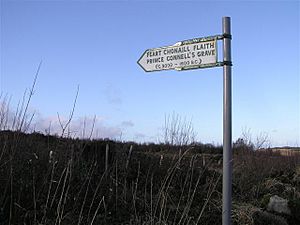Flaith facts for kids
A flaith (pronounced "flah") was an important person in ancient Ireland and Scotland. The word comes from the Irish language and Scottish Gaelic. It usually meant a powerful family member or a noble person, like a lord or aristocrat. It didn't always mean a king, but it meant someone with a lot of power and influence.

What Was a Flaith?
In the old Gaelic world, a flaith was a member of a strong family. These families had a lot of sovereignty, which means they had a lot of control and independence. So, the term "flaith" could mean a noble or an aristocrat. It could also refer to the idea of sovereignty itself.
Flaith vs. King
A flaith was not always a king (called a Rí in Irish). A king held a specific position. A flaith, however, might be a king, or they might be a powerful person who was still under the king. Think of it like a very important noble who worked for the king. This is a bit like a tacksman in the old Scottish clan system.
Later on, the word flaith sometimes got mixed up with the idea of a "chief." But a Gaelic "chief" was often a king of some rank. A flaith might just be a brother, nephew, or other relative of the king. They could also be the head of a smaller part of the royal family. Or they might be from another important family serving the king.
Flaith in Names
The word flaith became part of people's names. Over time, it even became part of family names. A famous example is the royal family of O'Flaherty. Their name, Ua Flaithbertaig, means "Descendants of the Bright Prince."
The word flaith could also be combined with rí (king). This formed names like Flaithrí, which means "Princely King" or "Kingly Prince." An example is Flaithrí mac Domnaill, who was a King of Connacht.
Banfhlaith: A Princess
A Banfhlaith (pronounced "ban-flah") meant a "Lady Prince." This was a more specific way to describe a princess. However, the word flaith itself was often used for high-ranking noble women. For example, names like Gormflaith ("Blue Princess") and Órflaith ("Golden Princess") were understood to be female names without needing the "Banf-" part. This shows that flaith was a general term for a member of the high nobility.
See also
- Tigerna
- Gaelic Ireland
- Gaelic nobility of Ireland
 | James Van Der Zee |
 | Alma Thomas |
 | Ellis Wilson |
 | Margaret Taylor-Burroughs |

